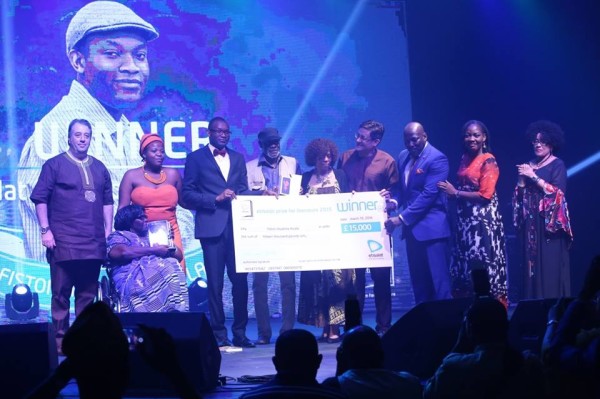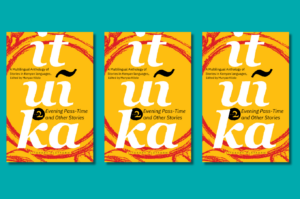Last saturday, in the online African literary community, all eyes were on Lagos. The award gala for the Etisalat Prize for literature was taking place and everyone held their breath waiting for the judges to announce the winner of the 15, 000 pounds award. You probably know by now that Fiston Mujila came out the winner for his novel Tram 83, an announcement that put the global African literary community in instant celebration mode.
While we celebrate Mujila’s win, we also need to congratulate the judges on successfully handling the very difficult task of selecting one of three amazing novels. Penny Bussetto’s The Story of Anna P and Rehanna Roussouw’s What Will People Say were also masterfully written and boundary pushing novels and, as such, close contenders.
In a Facebook note posted yesterday, Professor Ato Quayson, the chair of the judging panel—which included Zukiswa Wanner and Molara Wood—commented on the prize. He said it was “a magnificent gift to the world of African letters. He also went on an extended tribute to the city of Lagos. A #mustread.
Read below.
As Chair of the Jury for the 2015 Etisalat Prize for Literature, it was a tremendous pleasure to announce the winner, Fiston Mwanza Mujila, for his book Tram83. Starting this weekend I will be writing separate reviews of all the three novels on the final shortlist, the other two being Penny Bussetto — The Story of Anna P, as Told by Herself, and Rehanna Roussouw — What Will People Say. The reviews will be posted on Africa is Not a Country, Brittlepaper, and on other venues that have an interest in promoting African writing. The idea is for us to take direct responsibility for spreading the word as widely as possible.
The awards ceremony itself was a magnificent gift offering to the world of African letters, and Etisalat must be fully congratulated for putting on such a beautiful and moving event. For my own part I am now fully convinced that everyone must visit Lagos and Nigeria at least once before they die. Even though I did my dissertation on Nigerian literary history, have been to the country before and count many Nigerians as good friends, this time I was strongly reminded of why they are the true giants of Africa (Sorry SA, you still have a few things to learn from Nigeria). My conclusion is not based exclusively on the evidence of the awards ceremony, terrific though it was. It is based on a simple tour I was taken on of Lagos earlier that afternoon. Molara Wood, one of my comrade judges, had arranged the day before for a friend of hers to come and take me on a tour of central Lagos. This was to satisfy my well-known hunger for knowledge about African cities. Mr Olajide Bello was the one she had suggested and he came to pick me up promptly at 11.30 in the morning. Bello is a lawyer in his late 40s who moved from Jos when he was 18 to attend law school in Lagos, and after a short stint back home for work, decided to settle in Lagos for good. I could not have had a better tour guide. Apart from being a well-established lawyer, he is has a finely-tuned cultural sensibility and well-versed in music (the jazz in his car, man!), literature, and the arts. He is also extraordinarily curious about everything around him. Consequently the minute details was able to tell me about the Central Business District of Broadstreet, its fine historical and geographical features, and its unsteady synchronicities with the rise and fall of Nigeria’s political fortunes was a humbling lesson for any urban researcher interested in this elusive metropolis. The high point of our tour was when he parked his car and got us to hop into a keke marwa, a yellow painted three-wheeled motorbike taxi, that took us on a slow and winding drive through the thicket of people in Balogun Market and its environs. It was my first time in anything like this I was completely taken!
After the tour I said to him, I said: “All the time you thought you were talking to a fully grown adult, but not knowing that it was a child you had with you today”.
*************
Image from Prof. Quayson’s Facebook page.










Yiro Abari High March 23, 2016 03:49
Thanks for the great things you said about my country, Prof! I had just posted a review of a book "Honor and Polygamy" on my blog. In the review, i noted how the author got me to see the brilliant face of Afghanistan, the setting of his story. Prior to reading his book I had in my mind the portrait of Afghanistan painted only in one dull color. The portrait of Nigeria in the minds of many around the world has, sadly, been one of one dull color. Thanks again, Prof for this positive review of Lagos, the old Capital of Nigeria.